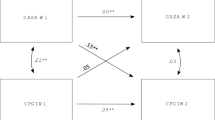Abstract
This paper provides further thoughts and observations on Richard Wood’s paper “Problems with the concept of video game “addiction”: Some case study examples (this issue). Wood argues against the concept of ‘videogame addiction’ but very few of the arguments presented by Wood negate its existence. Just because the few empirical studies appear to overestimate the prevalence of ‘videogame addiction’, it does not mean that the condition does not exist. Furthermore, some of the assertions made by Wood are arguable. Furthermore, Wood does not put forward his own preferred criteria for addiction. This is especially problematic when using his own case studies to negate whether ‘videogame addiction’ exists. Until addiction researchers agree on what it is to be addicted, we will never get agreement on whether behavioural excesses like videogame playing can be classed as a ‘genuine’ addiction.
Similar content being viewed by others
References
Chappell, D., Eatough, V. E., Davies, M. N. O., & Griffiths, M. D. (2006). EverQuest—It’s just a computer game right? An interpretative phenomenological analysis of online gaming addiction. International Journal of Mental Health and Addiction, 4, 205–216.
Cole, H., & Griffiths, M. D. (2007). Social interactions in massively multiplayer online role-playing gamers. CyberPsychology and Behavior, 10, 575–583.
de Freitas, S., & Griffiths, M. D. (2007). Online gaming as an educational tool in learning and training. British Journal of Educational Technology, 38, 536–538.
Griffiths, M. D. (1991). Amusement machine playing in childhood and adolescence: A comparative analysis of video games and fruit machines. Journal of Adolescence, 14, 53–73.
Griffiths, M. D. (1995). Adolescent gambling. London: Routledge.
Griffiths, M. D. (2000). Does internet and computer "addiction" exist? Some case study evidence. CyberPsychology and Behavior, 3, 211–218.
Griffiths, M. D. (2002). The educational benefits of videogames. Education and Health, 20, 47–51.
Griffiths, M. D. (2005a). A “components” model of addiction within a biopsychosocial framework. Journal of Substance Use, 10, 191–197.
Griffiths, M. D. (2005b). The relationship between gambling and videogame playing: A response to Johansson and Gotestam. Psychological Reports, 96, 644–646.
Griffiths, M. D. (2005c). Video games and health. British Medical Journal, 331, 122–123.
Griffiths, M. D. (2005d). The therapeutic value of videogames. In J. Goldstein & J. Raessens (Eds.), Handbook of computer game studies (pp. 161–171). Boston: MIT Press.
Griffiths, M. D. (2007). Videogame addiction: Fact or fiction? In Willoughby, T. & Wood, E. (Eds.). Children’s learning in a digital world (pp.85–103). Oxford: Blackwell Publishing.
Grüsser, S. M., Thalemann, R., & Griffiths, M. D. (2007). Excessive computer game playing: Evidence for addiction and aggression? CyberPsychology and Behavior, 10, 290–292.
Hussain, Z., & Griffiths, M. D. (2007). Gender swapping and socialising in cyberspace: An exploratory study. CyberPsychology and Behavior (in press).
Keepers, G. A. (1990). Pathologicical preoccupation with video games. Journal of the American Academy of Child and Adolescent Psychiatry, 29, 49–50.
Kuczmierczyk, A. R., Walley, P. B., & Calhoun, K. S. (1987). Relaxation training, in vivo exposure and response-prevention in the treatment of compulsive video-game playing. Scandinavian Journal of Behaviour Therapy, 16, 185–190.
Wood, R. T. A. (2007). Problems with the concept of video game “addiction”: Some case study examples. International Journal of Mental Health and Addiction, this issue.
Wood, R. T. A., Griffiths, M. D., & Parke, J. (2007). The acquisition, development, and maintenance of online poker playing in a student sample. CyberPsychology and Behavior, 10, 354–361.
Author information
Authors and Affiliations
Corresponding author
Rights and permissions
About this article
Cite this article
Griffiths, M.D. Videogame Addiction: Further Thoughts and Observations. Int J Ment Health Addiction 6, 182–185 (2008). https://doi.org/10.1007/s11469-007-9128-y
Received:
Accepted:
Published:
Issue Date:
DOI: https://doi.org/10.1007/s11469-007-9128-y




